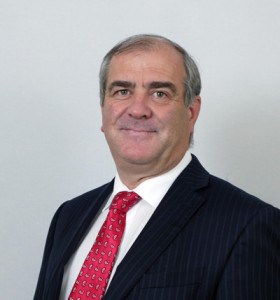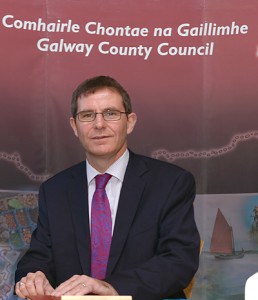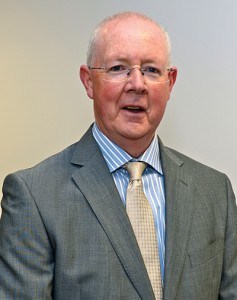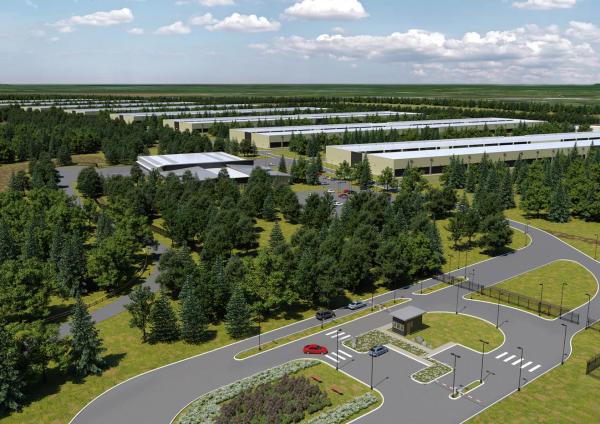Invest In The West
Galway and the surrounding regions are currently buzzing with start-ups, micro enterprises and international companies who’ve recognised the area as a great place to do business. As part of our Invest in the West series, Denise Maguire speaks to the people on the ground who are helping to facilitate and support these investments.
Apple’s decision to locate its first non-US data centre in Athenry provided a welcome boost to the county. With global technology leaders like Apple choosing Galway as a place to do business and indigenous firms making the decision to stay at home, it looks like efforts to drive and promote FDI in the region are paying off. IDA Ireland believes that more than 300 construction jobs will be created throughout the multiple phases of the €850 million project. “The entire West of Ireland is underpinned by a robust performance of FDI companies over many years. Some of the best names globally and internationally already have a presence here. We need to maintain the focus on inward investment and ensure appropriate and competitive property solutions are in place coupled with ongoing investment in infrastructure. These are the challenges for 2015,” says Frank Conlon, Head of Property Division at IDA Ireland.
The €150 million approved Government property investment programme from 2015 to 2019 forms a key component of IDA Ireland’s FDI plan. “The vast majority of this investment will go into regional Ireland. The first tranche of buildings have been selected and they will be located in Sligo, Castlebar and Tralee.” The potential of these areas in attracting and winning foreign direct investment is the reason for their selection. “For Regional Ireland, that €150 million between 2015 and 2019 will act as an economic lever. Constructing a building immediately gives a location the ability to win additional investment and create jobs.”
Galway is home to a large number of innovative, technology driven indigenous companies but it’s also firms like Apple that are realising the benefits of the area. “The skills within the construction sector from design, planning, engineering and construction to after market and facilities management are key element in successfully winning projects for the West Region. This as a key competency where companies in pharma, life sciences and ICT industries depend on and are benchmarked against competitor locations globally.”

Frank sees the FDI model as an extremely successful, robust one. “It continually returns value to the State. There are challenges around the distribution of FDI and it’ll be difficult to get investment into some of the smaller locations around the country. However with a proven FDI track record and the organisation’s new strategy focus, further progress in the regions will be achieved in the period ahead.”
Frank stresses the important role that design, engineering and construction firms play when it comes to winning new FDI investments. “These skills sets are crucial. We shouldn’t take our eye off that ball in the value they add to sector. There are many other competitor locations globally that do not have the excellent performance and track record in engineering, design and construction that underpins Ireland’s ability to respond in an agile and professional manner in meeting FDI client needs.”
In 2014, Galway City was named Europe’s Micro City of the Year by the Financial Times. In a study of the most promising investment locations in Europe, fDi Magazine (a Financial Times publication) crowned Galway City a winner of a European City and Region of the Future 2014/15. Galway City was also the only micro city to be listed in the Top 25 overall European Cities of the Future. “That win was based on a number of economic indicators and the growth of multinationals and local businesses but crucially I think it came down to the openness of the city to engage and the ease of doing business in Galway,” says Liam Hanrahan, Economic Development Unit at Galway City Council.
The role of the Economic Development Unit is to consider the wider economic strategy for the city and liaise with Enterprise Ireland and the IDA in supporting firms in the area. Currently, the main initiative is developing the Galway City and County Economic Strategy. “Through that, we’ll be identifying the various strengths and opportunities of the region and aiming for improvement. The ‘Capital of Culture’ project is also a huge piece of work. If Galway is going to be successful there will have to be improvements to cultural infrastructure made and various programmes developed.”
Multinationals in the MedTech and ICT sectors have been busy setting up shop in Galway over the past few years. “Successful cutting-edge companies from the MedTech sector in particular are now doing business in Galway. In the IT sector we have a couple of the larger players like HP but we also have a lot of mid-sized and start-up firms. We’re working with a couple of those companies at the moment around structural development, trying to ascertain what type of space they’ll need in the future and what they think we need to be applying for.”
Attracting both FDI companies to the city and ensuring indigenous firms receive the supports they need to remain in Galway are equally important to the Council. “Enterprise Ireland and IDA Ireland are there to work on the larger scale while the Local Enterprise Office looks after the start-ups and the indigenous firms. If the IDA is out there doing their job in Silicon Valley they’ll be attracting companies to Ireland, but not necessarily to Galway. Our job is to work with them and decide what needs to be done in Galway to get our name mentioned in that meeting in Silicon Valley. It’s our job to promote Galway as an ideal place for multinationals to set up.”
Jointly organised by Galway City Council and Innovating West, speakers at a recent conference made the point that multinationals like to base themselves in bustling areas. “They don’t want to be out on their own because they thrive off each other. Multinationals themselves were saying they’re interested in developing with local companies and the local companies were saying their skills could only be improved by engaging with multinationals, particularly in the ICT sector. Having these firms located in the same areas will only increase business and ensure companies are successful.” An initiative that might drive this idea is a start-up digital base in the city centre for start-up companies. “There’s a definite lack of action in the city centre and a lot of business and industrial parks on the outskirts of town. There are spaces in the city centre that could be very useful for businesses, particularly in the tech industry. The team behind Innovating West are trying to get people to live, work and invest in the city centre. They’re currently identifying a number of locations that would be good for that.” Getting the message out there that Galway City is open and ready for business is key. “The City Manager and the Mayor are just back from a trade mission to California and Seattle. There are only a limited number of times that our Mayor goes abroad in any one year so we have to make the connections work.”
Working in partnership with other development bodies, Galway County Council is investing significant resources in developing infrastructure that will improve competitiveness and provide services to support economic development. These services will, says Catherine McConnell, Acting Director of Services at the Council, directly assist enterprises to achieve their full potential. “As a Local Authority we are becoming more charged in our role as leaders on local economic development and as part of our new statutory remit we’re currently preparing a joint Economic Development Strategy with the City and a new Local Economic and Community Plan.” The Council is also becoming more conscious of all the activities it does as a local authority that could impact positively or negatively on economic development and business. “Somebody who has a potential job creating proposal can come to us and we would fast-track them to a pre-planning meeting. We’d end up seeing these people in a matter of days so they can meet supply chain demands or expand their business in a timely way.” As an additional incentive to assist business, Galway County Council has held the commercial rates at 2009 levels. “We’re very aware of the difficult economic environment that businesses are operating in. Our new county development plan is trying to be very supportive of local economic development initiatives.”
Apple Corp’s recent decision to locate its first data centre outside the US was facilitated by Galway County Council’s decision to designate an area of land that extends in a 5km wide corridor from the edge of Galway City eastwards towards Athenry as a Strategic Development Corridor. “The further development of the M18/M17 motorway from Limerick to Mayo will increase the accessibility of the two international airports in the region at Shannon and Ireland West Knock. This improved accessibility heightens the central location of County Galway on the west coast of Ireland,” says Acting Chief Executive of Galway County Council Kevin Kelly.

In 2013 Galway County Council launched the joint Galway Local Enterprise Office with Galway City Council, providing direct supports to start-up enterprises in the County and City. Companies supported by the Galway Local Enterprise Office are creating new jobs in the region, which in turn is helping to fuel economic recovery. The creative sector is also emerging as a strong employment growth sector in Galway, says Catherine. “The recent designation granted to Galway City and County as UNESCO City of Film is recognition of the commitment and support for this sector while a number of film and media production companies based in the west of the county are building a strong reputation nationally and internationally.”
Galway County Council is convinced that with Galway-based manufacturing companies consolidating their position, growth in food and tourism sectors and the emergence of a cluster of multimedia companies, green shoots are appearing throughout County Galway. According to Kevin Kelly: “The emergence of so many micro enterprises on the ‘www.madeingalway.ie’ website indicates there is an entrepreneurial spirit in the County that is seeing people go for it in business. Optimism is creeping back into the air in Galway and with new projects coming on stream in the coming months, this positivity is going to continue.”
With finance an issue for any entrepreneur or early stage company, Enterprise Ireland are committed to sourcing new streams of investment for start-ups and indigenous companies in Galway. “We try to encourage and support entrepreneurs who are looking for risk money that will expand their businesses internationally. Banks have not been very forthcoming when it comes to cash investment in start-ups so it’s our job to help create different mechanisms that will enable our clients start, grow and scale,” says Barry Egan, Director West Region at Enterprise Ireland. A number of structures already exist in Ireland; one of these structures is Business Angels of which there are two types. “The first is the Business Angel Partnership which is managed by the Business Innovation Centres nationally and WestBIC in the West. Angels are matched up with individual promoters or companies for a private investment. The second are Syndicates of angels.” In the Galway region there is one MedTech syndicate operating which only last year announced significant investments in two companies.
When it comes to FDI and supporting local companies, Enterprise Ireland’s role differs from that of the IDA. “We support the creation of high growth companies, get them to scale up and go international which ultimately creates jobs in Ireland. The IDA would be dealing with existing companies that have formed management teams whereas our job is to grow Irelands’ export base and help new companies get started and get their feet on an international level.” Enterprise Ireland also work across all aspects of the structure of a company from R&D and finance to HR and operations. “We have a range of direct and indirect supports to help the development of a company. We work on a one to one basis to help them but also to challenge them to develop.”
According to Barry, the level of start-ups in the region is quite buoyant at the moment. “Two of the largest funded start-ups last year were MedTech companies who between them raised €5 million and who are employing 15 people already.” Start-ups are also supported through the New Frontiers Programme based out of GMIT, an initiative that helps people turn their business idea into reality. “Out of that programme we’ll take 10 to 15 of them and support them over an intensive six month period. They’ll get a range of financial and non financial supports.”

The importance of third level talent is also supported by Enterprise Ireland through a programme called the Student Entrepreneur Programme. “We’ll get 200 or 300 applications from students who want to turn their idea into a company. Encouraging students and graduates to embrace entrepreneurship and go out start their own venture is very important and a potentially lucrative source of new start-ups. Both the Local Enterprise Offices and Enterprise Ireland have programmes in place to support youth entrepreneurship at 2nd and 3rd level retrospectively.”
One of the institutions producing these graduates is NUI Galway, a university that constantly ensures students benefit from high-class facilities for programmes that are increasing in size or are newly added to its portfolio. Keith Warnock, Vice President for Capital Projects at NUI Galway, stresses the importance of matching programmes with research emphasis in the universities. “For instance one of the areas where we’ve recently added research buildings is in the biomedical area. We have to make sure we have high quality graduates in the areas that FDI might be interested in.” Post-graduate education is focused in areas where NUI Galway is particularly strong. “These areas are also linked to key industrial clusters like, again, the biomedical area. Galway is very strong in the medical devices field. What we have to do is make sure we have research in that area and that we are training researchers so they can go from our labs into industry and provide the personnel that’s needed.”
NUI Galway recently received significant funding for CÚRAM, a centre for research in medical devices. “What is crucial about that sort of development is that it’s in conjunction with local industries. We’re able to demonstrate to those who are funding this type of research that we have industry links and crucially, the industry would not be coming in with us on this type of activity if we didn’t have the necessary expertise in this area.”
The campus at NUI Galway has been extended significantly over the past few years. In excess of 25% has been added to the built space; this includes a range of buildings including the award-winning engineering building which covers 14,000 sq ft. “Another example is the research bundle. We identified a major deficiency in our space for research activity so we built three buildings, one for research in the arts, humanities and social science where we house our archive collection. Another is in the biomedical science area and the third is on the hospital campus and is called our Translational Research Facility. That building is just being completed. These buildings will reinforce the facilities we have to offer and give us the opportunity to continue to produce graduates and employ researchers who are supportive of the type of development that’s going on in the region.”
Representing approximately 500 companies, Galway Chamber works for the interests of businesses and for the economic development of the city and region. Activities include influencing decisions and lobbying on behalf of businesses, providing opportunities for business networking, export documentation, trade information and business promotion and support. Frank Greene is President of the Chamber; he also sits on the board of Chambers Ireland and is Chairperson of Galway Technology Centre, an enterprise centre of which the Chamber of Commerce owns 70% of. “We are the only Chamber in Ireland that actually owns an enterprise centre. It gives us regular access to Enterprise Ireland and to the IDA and also to the Local Enterprise Office so it brings credibility to the Chamber.” The Strategic Committee on the Chamber recently put together a five year Economic Development Plan. “The plan was launched by An Taoiseach last year and we’ve placed it with the Western Development Commission and city and county councils.”
Galway Chamber of Commerce is heavily involved in supporting local companies. Monthly ‘Business After Hours’ groups, which provide important networking opportunities for firms are a regular fixture while educational conferences are also held on various topics affecting companies.
The Chamber plans to hold a Venture Capital/Equity Conference that will bring both international and Irish venture capitalists together. “I think that in Ireland, we’re very good at going from 0 to 30 but it’s making the jump from 30 to 250 that’s the problem. One of the key reasons for that is the lack of equity or venture capital money and this conference is open to those companies who are interested in that.” Frank says venture capitalists are mostly located in Dublin. “We want to get them down to Galway and get them to see the opportunities down here. There’s such a vibrant hub of ICT, MedTech and biotech companies in Galway.”
The lack of available, ready to use shells for companies who want to position themselves in Galway City presents a massive opportunity to contractors. “The building opportunities in the city are huge. I know that the IDA would work closely with building companies who put forward a proposal to create these purpose built offices. It’s a win win for builders, it’s a win win for IDA and crucially, it’s a win win for Galway.”

